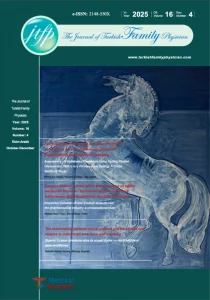The Effect of follow-up and counseling with mobile devices on HbA1c in Type 2 Diabetes
Objective: Patient and physician cooperation is of great importance for tight glucose control. In our study, the effect of closely following patients with mobile phone calls and reminder text messages on glucose regulation was investigated.
Materials and Methods: Patients who applied to our outpatient clinic between September 2019 and January 2020 were included in the study. Sociodemographic Data form, Clinical Data form, and Diabetes Self-Care Scale were filled. The results of the assays taken from the patients were recorded. The patients were randomly divided into control and intervention groups. Mobile phone calls were made for three months with the patients in the intervention group once a week. At the end of the three-months follow-up period, all patients were invited for routine checks. Both groups were analyzed for the change of assay results.
Results: 60.9% (n = 39) of the 64 patients who completed the study were at the age of 55-64. Body mass index (kg/m2) averages of the patients were found to be 30.4 ± 4.5. Diabetes Self-Care Scale scores were found to be “insufficient” with an average of 83.7. While the mean glycosylated hemoglobin A1c level of the patients in the intervention group was 8.8% on average, it was found 7.2% at the end of the study and there was a significant difference between the results.
Conclusion: Following the patients by mobile phone may have a positive effect on follow-up parameters.



